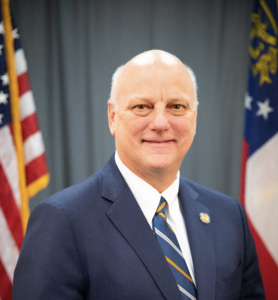Stay ahead of the curve as a political insider with deep policy analysis, daily briefings and policy-shaping tools.
Request a DemoNewly passed legislation could ease HOPE eligibility for foster youth

Students walking to class. (Credit: Sinseeho)
This story is part of a recurring series on the state’s foster care system and those aging out of it. Read Part 1 here.
Editor’s note: Gov. Brian Kemp vetoed House Bill 1231 on May 7, saying in a written statement the legislation could cost taxpayers over $25 million.
The Gist
Young adults aging out of Georgia’s foster care system got a big assist from state lawmakers this legislative session with the passage of House Bill 1231, which will make it easier for young people in, or who have been in, the state foster care system to be eligible for the HOPE Scholarship.
“This is a major milestone,” Eshontee Rowe, a former foster care youth who is now an Atlanta child welfare consultant, told State Affairs. Rowe spent time at the Capitol during the session, which ended March 28, monitoring bills involving foster care.
“Both the House and Senate care about young people who are transitioning through the foster care system and that they have equitable opportunities [similar] to young people who are in traditional homes,” Rowe said.
What’s Happening

HB 1231 allows current and former foster care youth to be eligible for a HOPE Scholarship for up to 30 semester hours of college credit without having the required 3.0 grade point average as long as they meet the minimum standards of the college they are attending or plan to attend, according to Sen. Brandon Beach, who carried the bill in the Senate. The bill covers people up to the age of 28.
“It gives them a start. It gives them an opportunity to get into college and get the Hope Scholarship without having a 3.0,” Beach told State Affairs. “ A lot of these kids are coming out at 18-, 19-, 20-years-old and they don’t have the grades. We want to give them a chance to get educated and get a degree and get employed.”
Once they’ve surpassed those 30 hours, they must maintain a 3.0 to keep the scholarship, Beach said.
Why It Matters
Each year in Georgia, 500 to 700 young adults between the ages of 17 and 21 age out of the foster care system and are left to fend for themselves, often with negative consequences. Some end up homeless, in jail or become parents.
“They’ve had a rough go,” said Beach. “When they age out of the foster care system, they have no support system. They have to go to work right away and try to make ends meet and then they want to go back and get educated either at a technical college or a four-year institution.”
Beach said he was particularly moved to do something in the Legislature after learning what happens to many foster youth once they leave the system.
“One of the things that opened my eyes is that 72% of the girls that age out of foster care at 18, they’re pregnant by 21 years,” he said. “That just continues a cycle of no good. So, we’ve got to continue to help these kids and get them mentored and get them educated. We want to help them all we can.”
Georgia has about 11,000 children in foster care due to abuse, neglect, family drug addiction, violence, behavioral problems or other hardships. Georgia’s foster care system is stretched so thin that children spend about two years in the system — nearly three months longer than the national average of 21.7 months, according to The Council of State Governments Southern Office.
Young adults in foster care face the greatest hardship.
One in 6 between the ages of 17 and 19 end up homeless while 1 in 4 between the ages of 19 to 21 are homeless. Nearly 1 in 10 report having or fathering a child by age 19 and nearly 1 in 5 are incarcerated by the time they are 19-years-old, according to the Annie E. Casey Foundation Kids Count Data Center.
What’s Next?
HB 1231 has been sent to Gov. Brian Kemp for his signature.
“This last legislative session proved that we are making headway in the foster care [system], the child welfare industry,” Rowe said.
Have questions? Contact Tammy Joyner on X @lvjoyner or at [email protected].
And subscribe to State Affairs so you do not miss any election news you need to know.
Related stories:
Professionals still face licensing delays amid state’s transition to online system
The Gist Georgia’s professionals and business owners are still struggling to obtain professional licenses in a timely manner. As the Secretary of State’s Office rolls out its new Georgia Online Application Licensing System to expedite the process, the efficiency of this new process is being put to the test. What’s Happening Thursday morning at the …
Controversy over AP African American Studies class grows
Rashad Brown has been teaching Advanced Placement African American Studies at Atlanta’s Maynard Jackson High School for three years. He’ll continue to do so — even though the state’s top education official removed it from the list of state-funded course offerings for the upcoming school year. While Brown prepares to start teaching his class on …
Students, teachers, lawmakers blast decision to end AP African American history classes
ATLANTA — A coalition of lawmakers, civil rights leaders, clergy, educators and students Wednesday called on the state’s education czar to rescind his decision to drop an advanced placement African American studies class from the state’s curriculum for the upcoming school year. “This decision is the latest attack in a long-running GOP assault on Georgia’s …
Kamala Harris’ presidential bid reinvigorates Georgia Democrats
Georgia Democrats have gained new momentum heading into the November election, propelled by President Joe Biden’s decision to bow out of his reelection bid and hand the reins to Vice President Kamala Harris. The historic decision, announced Sunday, is expected to prove pivotal in the national and state political arenas and breathe new life and …




